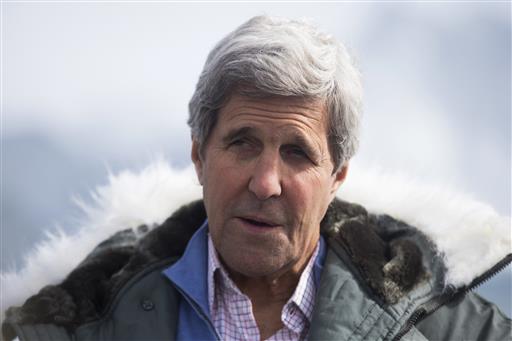
Secretary of State John Kerry speaks during a tour the Jakobshavn Glacier and the Ilulissat Icefjord, located near the Arctic Circle, Friday, June 17, 2016, in Ilulissat, Greenland. (AP Photo/Evan Vucci, Pool)
ROME — U.S. Secretary of State John Kerry will rush to Brussels and London on Monday to meet the top British and European Union diplomats, as the world grapples with the implications of Britain’s historic vote to leave the European Union.
Kerry will bring messages of support. Less likely: Answers or even suggestions for how to deal with a crisis that has spooked economists and forced countries in Europe and beyond to contemplate the possibility of unity across the continent crumbling.
The trip began Sunday in Rome, where Kerry has scheduled talks with Israeli Prime Minister Benjamin Netanyahu. He will also meet Italian government officials.
But confronted with the gravity of Britain’s June 23 decision, which crushed markets from the U.S. to Japan, Kerry has set up a frantic, four-nation schedule Monday.
After gathering with Netanyahu in the morning, he will fly to Brussels to discuss Europe’s situation with EU foreign policy chief Federica Mogherini. He will go from there to London to meet British Secretary Philip Hammond, before returning to Washington before the day’s end.
With the Brits, Kerry will echo last week’s immediate response from Washington focusing on the unchanged nature of the “special relationship” between the U.S. and the United Kingdom.
Even the gloomiest of predictions about the British exit from the EU, or Brexit, don’t foresee the collapse of the close cultural ties or military alliance between Washington and London. But how relations evolve is an open question, especially if Britain’s divorce from the EU causes significant economic pain in the United States.
Visiting Britain in April, President Barack Obama noted ongoing U.S.-EU trade negotiations and warned Britons that a vote to “leave” could put them at the back of the line for similar deals.
Since the result of the referendum, however, Obama and other American officials have gone out of their way to emphasize the durability of the relationship, playing down the idea of any repercussions from Washington.
In Brussels, Kerry will emphasize U.S. backing for the European project amid speculation that other member countries could follow Britain’s lead.
The Obama administration sees a strong EU as key to stability in Europe and as a critical partner in bringing security to nearby flashpoints in North Africa and the Middle East, and far-flung places of conflict like sub-Afghanistan. It also has counted on the EU to enforce sanctions on Russia since its annexation of Ukraine’s Crimean peninsula in 2014.
But it’s unclear what more Kerry, or the U.S., can say or do right now to help Britain or the EU.
Britain’s exit negotiations are likely to be a complicated, protracted affair, and there is no guarantee of a smooth breakup. The Americans are likely to have little say in the matter.
And the U.S. has no answer for Brussels’ dilemma over how to respond to the first loss of a member in its history.
RELATED STORIES
Britain’s EU workers gripped by fear, confusion, heartache
Europe demands quick divorce from divided Britain

